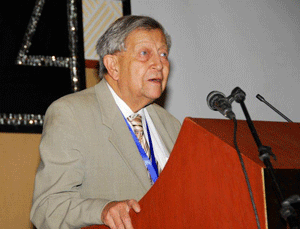
THE AHFoZ 2012 All-Stakeholders’ Conference on Health was held from September 4-7 2012 at Elephant Hills Resort, Victoria Falls.
Report by Enock Musungwini
The conference had a high powered line up of speakers who among them include Eric Bloch, an economist, Lawrence Toendepi from Metropolitan International from South Africa and Samson Mugumisi, the vice-president of Institute of People’s Management of Zimbabwe (IPMZ). It generated a lot of debate and there was a lot of dialogue with different critical issues emerging from the dialogue. Summary of presentations: Bloch, an economist presented on economic environment and impact on the healthcare industry. He spoke about the microeconomic environment where only 7% of the population was employable and the diminished funding towards healthcare. Bloch emphasised the need for more cooperation and collaboration between public and private sector players in support of healthcare delivery. Another presenter, Lawrence Toendepi from Metropolitan International in South Africa presented an overview of the medical aid industry from a regional perspective. Other topics covered included cost containment from the private hospitals association (Phaz) perspective and also from the medical practitioners’ (Zima) perspective. Roseland Jena from National Healthcare Trust of Zimbabwe presented on fostering public-private partnerships in healthcare.
Various models and best practices were explored and stakeholders present were encouraged to emulate and replicate some of the admirable best practices highlighted. James Matiza from Nssa touched on the Uninsured populace and the way forward. As reported in Shylet Sanyanga’s presentation, that about only 8% of the country’s population currently have health insurance leaving about 92% without health insurance cover.
Matiza gave a background of the National Health Insurance Scheme (NHIS) and the feasibility of Zimbabwe adopting the model based on research done. However, stakeholders and delegates present felt there was need for current research to be done to explore the feasibility of NHIS due to the dynamics of the current economy. The deputy director for Non-Communicable Diseases in the Ministry of Health and Child Welfare, Clemenciana Bakasa presented on the burden of Non-Communicable Diseases and she encouraged stakeholders and the public to focus on health promotion activities including diet and exercises among other things. Another presenter, Tungamirirai Simbini called upon stakeholders in healthcare to adopt the e-heath strategy for the better of the industry. In his presentation on the state of digitalisation in healthcare and the way forward, Simbini highlighted the challenges faced by medical funders in trying to adjust to different systems at different pharmacies as well as different pharmacies and other service providers having challenges in having to adjust to different medical aid societies.
- Chamisa under fire over US$120K donation
- Mavhunga puts DeMbare into Chibuku quarterfinals
- Pension funds bet on Cabora Bassa oilfields
- Councils defy govt fire tender directive
Keep Reading
Simbini called upon stakeholders in healthcare to create group platform and have systems that communicated together for interoperatibility. Among the benefits, there will be improved patient management, cost containment, better reporting and availability of statistics and records. However, Simbini stated some of the challenges and efforts that need to be done to pave way for full digitalisation of the health sector among other things are legislative issues, policies and regulations. Regulatory authorities need to support and provide an enabling environment for the realisation of the goals.
Resolutions and emerging issues from the conference The need to invest in IT by both funders and service providers to promote interoperability and improve service delivery and efficiency. AHFoZ, Zima, Private Hospitals Association and other service provider groups to closely engage on tariffs for the benefit of patients. The ministry of Health should engage the ministry of finance on waiving duty on medical equipment imported by different service providers because increase in cost of equipment have a ripple effect to the whole supply chain. Consumers who are members to various medical aid societies and patients to health service providers need more education and representation when the stakeholders engage at such conferences where matters of common interest are discussed. Absence of a harmonised tariff continues to affect members and patients since in some instances the shortfalls are huge. AHFoZ has made tremendous progress on implementation and addressing the 2011 summary of issues though some action items require the support and cooperation of other stakeholders while others falls under the direct responsibility of other stakeholder and authorities.
In February 2012, AHFoZ held a strategic planning workshop to work on the 2011 conference outcomes and three quarters of the resolutions have been addressed among other things scaling upon public-private partnerships and engaging various services providers and stakeholders.
In these areas, AHFoZ conduct stakeholders visits and liaison meetings with various service providers while on PPPs AHFoZ is working with the National Aids Council on procurement of affordable ARVs for the private sector, thereby decongesting the public institutions. AHFoZ is also involved in capacity building of its members on adjudication processes. An adjudication training workshop for adjudication staff of medical aid societies who are AHFoZ members will be taking place on October 4 to 5 2012.
Furthermore, AHFoZ also supports service providers like hospitals on billing training to enable them to claim correctly from medical aid societies. There is a planned medical billing training for hospitals in November 2012.








